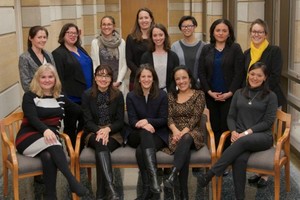 Attendees at the April 9 workshop on research by women studying violence.
Attendees at the April 9 workshop on research by women studying violence.
More than a dozen women scholars on the forefront of violence research in political science took part April 9 in a workshop co-sponsored in part by two Keough School for Global Affairs institutes, the Kroc Institute for International Peace Studies and the Kellogg Institute for International Studies.
The invitation-only event was an innovative gathering aimed at increasing gender equality in academia and targeted early- to mid-career female scholars, including graduate students.
“Women scholars face specific challenges as they advance through their careers, and the visibility and impact of female-led research is lower,” said Kellogg PhD fellow and event organizer Lucía Tiscornia.
Participants – many of whom have worked in areas of the world wracked by conflict or gang activity – presented and discussed their research papers on topics related to violence.
The workshop was followed by an open panel discussion on “The Challenges of Conducting Fieldwork, Through a Gender Lens,” focusing on the unique issues women face in conducting fieldwork in violent or potentially violent areas, and more generally on challenges of conducting fieldwork as a woman.
Both men and women attended the standing room-only session at the Hesburgh Center for International Studies, during which panelists said their gender had been an asset in some situations and a disadvantage in others. One scholar described having an unexpectedly long and informative conversation with a male government official thanks to the “mansplaining that being a woman invites,” while another said she had been mistaken for a prostitute because she was traveling alone.
For all, there was the concern about being the target of violence.
One said a “constant security analysis” was an integral part of her fieldwork.
“For me, it was kind of constantly adjusting what I was doing,” she explained. “My research design needed to be flexible and adjust for the changing security situation.”
Tiscornia said the day was energizing but intense, with rigorous discussion in the closed-door sessions. Participants described the conversation during the public session as one that was both relevant and needed, she said.
“Personally, the event allowed me to strengthen existing networks and to build new ones, which will be key to the direction of my academic career going forward,” she said.
Workshop participants included a number of University of Notre Dame scholars: Kroc faculty members Catherine Bolten and Laura Miller-Graff; peace studies Ph.D. students Angela Lederach and Leslie MacColman; Kroc visiting research fellow Maria Koinova; Kellogg faculty fellow Jaimie Bleck; former Kellogg visiting fellow Sandra Ley of the Centro de Investigación y Docencia Económicas (CIDE) Mexico; and current Kellogg visiting fellow Gema Santamaria. Invited scholars from other institutions included Abby Córdova, University of Kentucky; Angélica Durán-Martínez, University of Massachusetts, Lowell; and Janice Gallagher, Rutgers University, Newark.
The event was also co-sponsored by the Gender Studies Program, the Institute for Scholarship in the Liberal Arts, and the Department of Political Science, all at the University of Notre Dame.
Notre Dame's Kroc Institute is one of the world's principal centers for the study of the causes of violent conflict and strategies for sustainable peace. The Kroc Institute offers BA and PhD degrees in peace studies and supports the International Peace Studies concentration of the Keough School Master of Global Affairs.
Originally published by Ashley Rowland at kellogg.nd.edu on April 12.